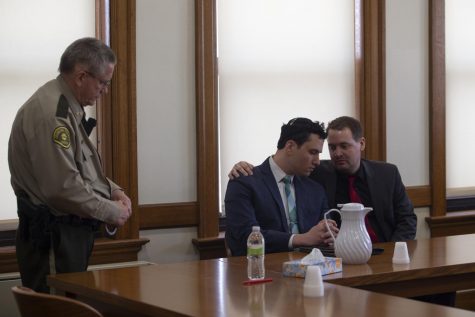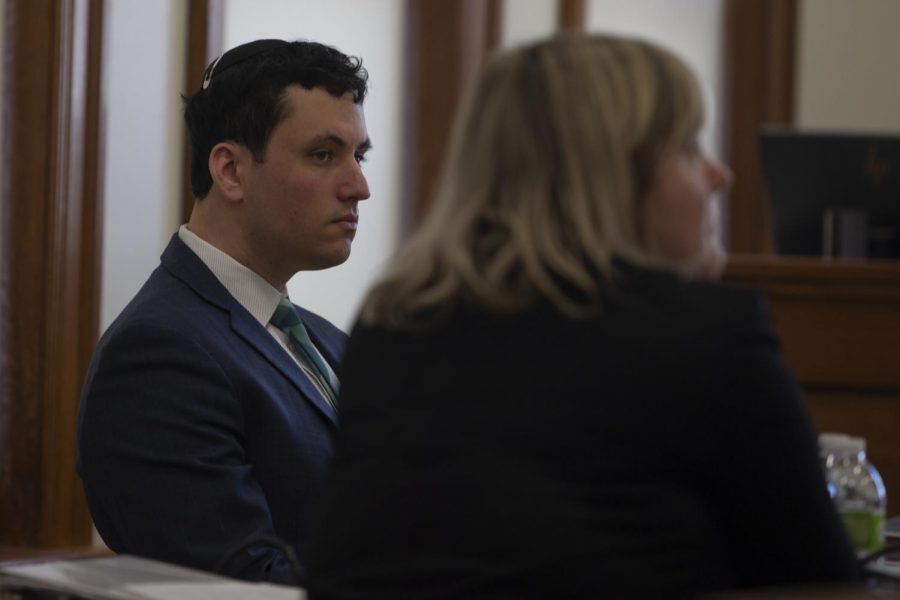Former Iowa Hillel Director David Weltman found guilty of sexual abuse
Weltman did not testify during his trial, which resulted in a unanimous guilty verdict from the jury.
Former Iowa Hillel Director David Weltman listens during the third and final day of trial on Thursday, March 5, 2020, at the Johnson County Courthouse. Weltman was found guilty of second-degree sexual abuse, a Class-B felony.
March 5, 2020
A jury unanimously found former Iowa Hillel Director David Weltman guilty of sexually abusing a 9-year-old boy during Hebrew lessons in 2019 after deliberating for around an hour and a half on Thursday.
Weltman, 29, of Skokie, Illinois, was charged Aug. 29 with second-degree sexual abuse and later pleaded not guilty. The abuse occurred sometime in February or March 2019.
Weltman did not testify during the trial on Thursday, asserting that he, not his attorney, made the decision to not take the stand. After the jury reached a verdict, he was taken into custody by the Johnson County Sheriff’s Office, where he will remain until his sentencing at 1:30 p.m. April 27.
Defense attorney Christopher Foster requested a motion for acquittal Thursday after witness testimony, just as he did on Wednesday. Sixth District Court Judge Chad Kepros again denied the request.
RELATED: Judge denies acquittal request of former Iowa Hillel House director in sexual abuse trial
The only witness the defense called Thursday was another minor — who will not be identified to protect privacy — who took Hebrew lessons with Weltman and the victim. The minor testified that Weltman sometimes picked up the students during lessons, but nothing ever happened between Weltman and the victim or at lessons that made the minor feel uncomfortable.
In the state’s closing statement, Assistant Johnson County Attorney Oubonh Phomvisay White told the jury the only things it had to determine were whether or not Weltman committed a sex act within the dates in question, during which time the victim was under the age of 12.
Based on testimony given Wednesday by Iowa City psychologist John Meidlinger, White said, sexual abuse is not a linear process, and context before and after the incident in question shows the sexual nature of the act.
“Things are not isolated incidents… You know from the evidence that isn’t what occurred. You know this isn’t an isolated, out-of-context situation,” White said.

Former Iowa Hillel Director David Weltman confers with his attorney Christopher Foster during the third and final day of trial on Thursday, March 5, 2020, at the Johnson County Courthouse. Weltman was found guilty of second-degree sexual abuse, a Class-B felony.
She also said that, even if Weltman found it necessary to touch the victim during Hebrew lessons, there is no way touching the victim underneath his pants and underwear could’ve been an accident. Even though there was also another student taking lessons, White said Weltman took the victim to a storage area where the other student wouldn’t have seen this contact.
“This contact was brief. Ask yourself, would anybody else have seen this contact between David and [the victim]? No. That’s the point,” White said.
The victim also did not change the story of what happened to him between telling his mother, law enforcement, Weltman and his attorney, and a jury full of strangers, White added. The victim did not tell his mother about any uncomfortable incidents with Weltman, she said, but the victim did not fully understand what had happened to him during Hebrew lessons.
“Children don’t always know. They can’t process what had happened to them. They don’t shout out, they don’t scream. They don’t run out and say, ‘Hey, this happened to me.’ They don’t know,” White said.
Foster said in his closing statement the only testimony the jury needed to pay attention to was that of the victim and the other minor; the other witnesses called by the state were a “distraction.”
Foster added the state’s case did not focus on whether or not the abuse occurred during Hebrew lessons.
“Ninety percent of evidence was about this trip to Israel,” Foster said. “Again, this is a distraction.”
Assistant Johnson County Attorney Rachel Zimmermann Smith added later in rebuttal that the jury could find Weltman guilty based on the victim’s testimony alone, but the context given by other witnesses also provides a clear picture of what happened.
The victim’s mother’s testimony also showed the mother saw red flags in Weltman’s behavior and comments made surrounding the Israel trip, Zimmermann Smith said, but Weltman had already established himself as a trustworthy person in the victim’s life as a teacher.
“She trusted him completely, and that was by design,” Zimmermann Smith said.







